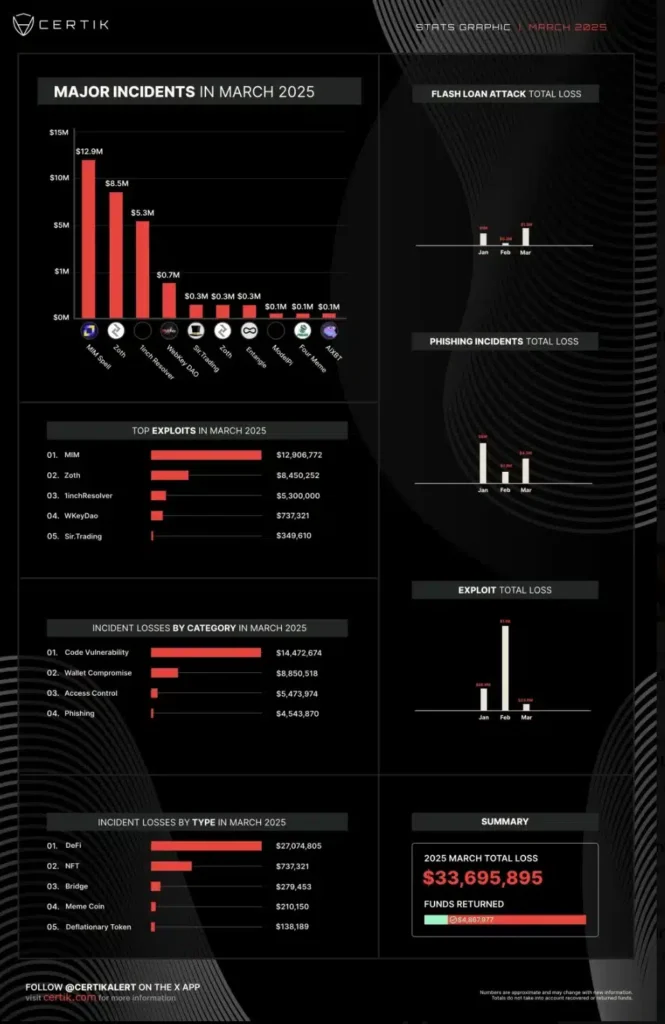Crypto hacks and scams fell dramatically in March — but the threat isn’t over. In fact, it’s evolving.
Scam and exploit losses totaled just $28.8M in March, down ~98% from February’s $1.5B, largely due to the Bybit breach.
But experts say the drop isn’t cause for celebration — especially as smart contract exploits remain the leading vector for losses.
“Code vulnerabilities accounted for the most losses — over $14 million,” said CertiK, a blockchain security firm.
The Smart Contract Blind Spot
Even with scam volumes dropping, a single smart contract breach on March 25 drained $13M from Abracadabra.money, a DeFi lending protocol.
The exploit used an old trick: recursive borrowing, liquidation, and record manipulation to extract funds that weren’t actually collateralized.
“The liquidation process didn’t overwrite collateral records, allowing repeated false borrowings,” CertiK explained.
This kind of flaw is harder to detect, easier to automate, and increasingly being targeted by professionalized attackers — even as phishing and wallet jacking dominate headlines.

Other March Breaches
- Zoth Protocol: $8.4M drained after deployer wallet compromise
- Coinbase user: Unreported 400 BTC (~$34M) lost
- 1inch: Recovered $5M via bug bounty deal
- Phishing scams: Estimated $46M in exposure
Despite the 98% drop, total known losses in March exceeded $33M, and likely higher with unreported incidents.
Regulation on the Horizon?
With Paul Atkins stepping in as Trump’s SEC Chair nominee, the administration is pledging a more rational and coherent crypto framework.
“A top priority of my chairmanship will be to provide a firm regulatory foundation for digital assets,” Atkins said during his Senate hearing.
Analysts say a friendlier but structured approach may help reduce rug pulls and contract exploits, especially as DeFi volumes rebound in Q2.
Scam volumes are down, but smart contract code remains the Achilles’ heel of DeFi. Until auditing becomes standard and enforcement sharpens, attackers will keep targeting the blind spots no one’s watching.
Related:
Why gold prices are surging to record highs
Stagflation Fears Surge on Eve of Trump’s Tariff Shock
China Restricts Companies From Investing in US as Tensions Rise
Tesla Could See Its Worst Quarterly Growth In Years As Deliveries Data Looms
Newsmax Soars 2200% After IPO — Who owns Newsmax, Valuation, Forecast
OpenAI closes $40 billion funding round, largest private tech deal on record
Tesla’s sales rout in Europe deepens in March amid anti-Musk protests
Trump aides draft tariff plans as some experts warn of economic damage
Gen Z Career Crisis: 4M+ US Youth Jobless, White House Under Pressure
How Truth Social And Crypto Helped Trump Double His Fortune In Just One Year
Trump’s Tariff Push Goes Global: “All Countries, All In”
Elon Musk to Step Down from DOGE After $1 Trillion Deficit Reduction










